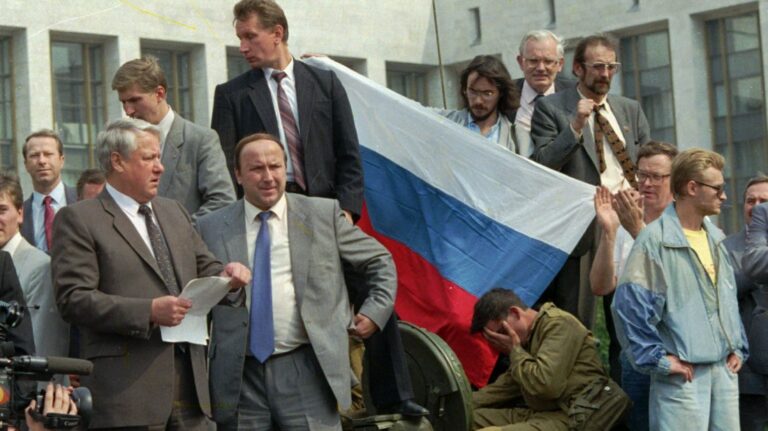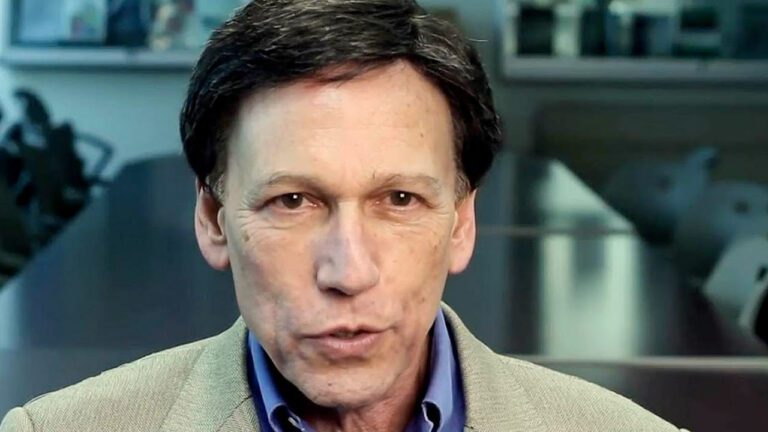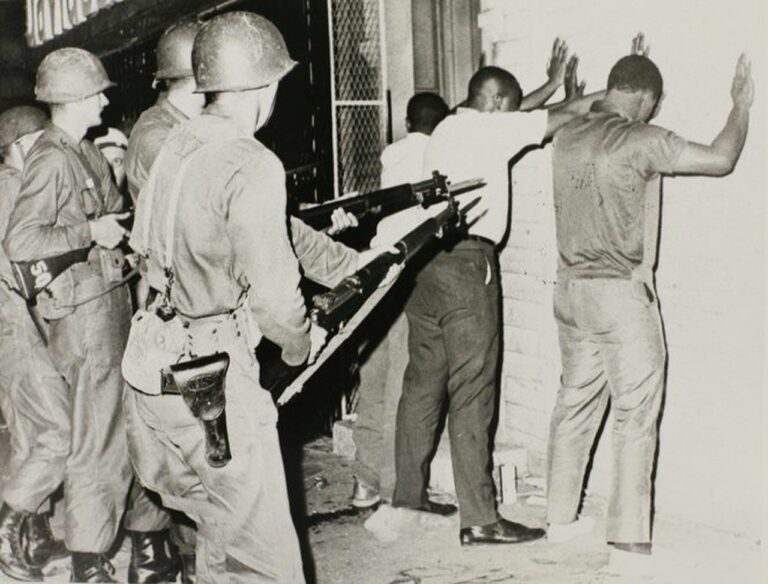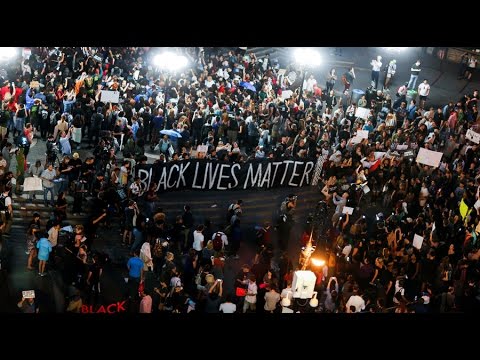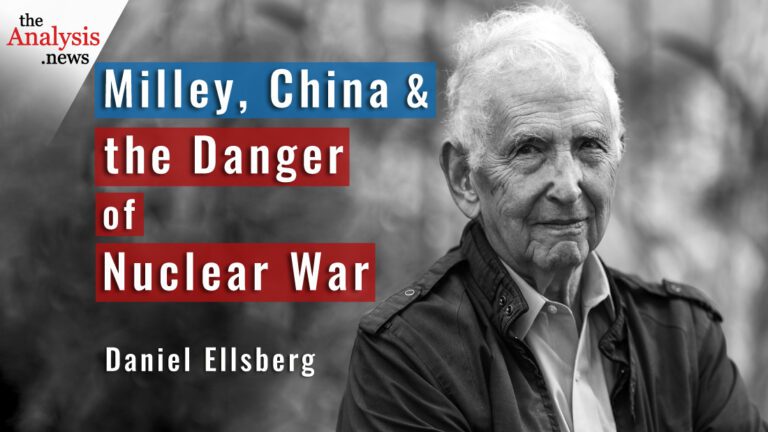This interview was originally released on April 22, 2014. On Reality Asserts Itself, Mr. Lander says while there are problems with the democratic process in Venezuela, the current protests are anti-democratic attempts to bring down an elected government.
PAUL JAY, SENIOR EDITOR, TRNN: Welcome back to Reality Asserts Itself on The Real News Network. I’m Paul Jay.
We’re continuing our series of interviews on Venezuela, and we’re moving on to the subject of democracy in Venezuela. If you haven’t watched the first parts of this interview, you really should, ’cause the whole point about understanding democracy in Venezuela is you have to contextualize things. It’s one thing to have a formal democracy in a place like the United States, where people that own stuff get that protected in a way that the rest of the people don’t have much say in it. And then the form of democracy, of free speech and such, that’s exercised in a way that’s not all that meaningful. There’s a Supreme Court decision just as recently that’s going to allow unbridled, unfettered use of money by corporations and organizations to fund politicians–that’s been deemed to be democratic.
I think the fundamental point here is that all countries are actually experiencing class wars in one form or another. So when you’re going to look at democracy, you have to look at democracy in the midst of a class war. It may not look like one when you watch the media of the United States, but there’s one going on every day. Just look who’s in prisons in the United States and look at the kind of justice people that don’t have money get at courts and throughout the judicial system, or come look at Baltimore and see the thousands of boarded-up houses. So when one talks about democracy, it’s a complicated issue. It’s not simple.
All that being said, we’re going to talk about democracy in Venezuela without trying to apologize for anything or cover up anything, because there are issues of democracy both positive and negative in Venezuela, and we’re going to talk about them as frankly as we can.
So now joining us again in the studio is Edgardo Lander. He’s a sociologist and professor at the Central University of Venezuela in Caracas. He was one of the main organizers of the World Social Forum in 2006. He holds a degree in sociology from the Universidad Central de Venezuela in Caracas. He has an MA and PhD in sociology from Harvard University. And he’s been very active in the trade union movement in Venezuela and progressive politics in general in Venezuela.
Thanks again for joining us.
PROF. EDGARDO LANDER, UNIVERSIDAD CENTRAL DE VENEZUELA IN CARACAS: Thanks for inviting me.
JAY: So the more sophisticated critics of Venezuela, Venezuelan politics, in the Western media–what I mean by that is–more sophisticated–in fact, they actually seem to know that there’s been, I don’t know, 17, 18 elections, and they’ve been observed by international observers, including Jimmy Carter, and the elections are always found to be clean. And I think one of the more important things about the elections in Venezuela is that the Socialist Party and Chávez forces, they don’t win all the elections. You know, they win–recently they won a majority of cities in the race for mayor, but they didn’t win all of them, and other times.
LANDER: And they lost the bigger ones.
JAY: And they lost some bigger ones, some state elections.
LANDER: Yeah.
JAY: Yeah. So, I mean, if this stuff’s all fixed, I mean, you might as well fix them all. And, I think, clearly the more sophisticated observers know that these elections have been won fairly.
What the argument now is is that in between elections, they used their elected power in an undemocratic way. And so what is your take on it? And start with kind of the current situation, and then we’ll get into kind of the broader questions of the structure of democracy in Venezuela.
LANDER: Well, in the current situation, in these mass mobilizations that have been occurring in different parts of the country, but especially in a few cities and certain parts of the cities, the upper class’s and middle class’s areas in the cities, if you look at the international media, if you look at CNN and The Miami Herald or El País newspaper in Madrid or–I mean, you get the impression that these are really pacific mass mobilizations that are overwhelmed by government repression, by tanks and killings, and this is a government that’s out to kill everybody. And that’s obviously not the case.
First, these mobilizations at this moment are part of a coup attempt. I mean, the main slogan of the mobilizations was “La Salida”–getting rid of Maduro. I mean, it was clearly not riots against food scarcity or any other particular issue, but an effort to get rid of Maduro.
JAY: Who won an election as president.
LANDER: Who won an election as president. And there were municipal elections a few months ago, and the government won by a difference of 10 percent. Ten percent. So it’s obvious that the government has majority backing in the country.
These mobilizations and these barricades, which are mostly barricades, more than anything else, are anything but pacific mobilizations. And nobody can pretend that there’s a constitutional right to blockade streets, to put barbed wire across the streets so that at least two motorcyclists have been killed, decapitated by the barbed wire. Nobody can claim to have a constitutional right to burn public buildings. Nobody can claim to have a constitutional right to have snipers killing policemen. And that’s what happened.
JAY: And if you compare that to the mass arrests in the United States at the Republican convention, the Democratic Party convention, or in Toronto, Canada, after the G20 meetings, where 1,000 people were arrested when clearly it was a handful of people that were involved in any violence, it’s the height of hypocrisy the way the Western media covers all this.
LANDER: Absolutely. Absolutely. Which doesn’t mean, of course, that this government reaction has been as it should have been. If one compares the current situation in Venezuela with what happened in the Caracazo, for instance, there’s obviously a difference.
JAY: Now, Caracazo–you have to watch one of the earlier episodes of the series. This was a big protest against the Washington Consensus and IMF-imposed restructuring of the economy that took place–again, what was the year?
LANDER: Eighty-nine.
JAY: Eighty-nine, where hundreds and maybe thousands of people were killed. And clearly nothing like that’s going on.
LANDER: In that case, the Armed Forces were told to shoot to kill, and that’s obviously not the case now. A few people have been killed by the repressive–the police or the military.
JAY: And some of them, apparently, have been arrested for it.
LANDER: And quite a few have been arrested. And so it’s a mixed, complex situation. It’s obviously not the case of a repressive government going out and shooting itself at pacific demonstrations. In some of the cases, these barricades have blocked many main arteries in big cities. [incompr.] They have made it extremely difficult for public transportation to work. They have made it extremely difficult to distribute food, for instance.
JAY: Which would never be tolerated in the United States.
LANDER: Never, I mean, not for five minutes.
JAY: Or most other countries.
LANDER: Yeah, in most other countries.
So there was a huge demonstration in Madrid a couple of weeks ago in which something like a million people participated, and the government called this a terrorist mobilization, terrorist. I mean, the scale of–. So it’s very, very cynical and hypocritical.
There’s been things in this recent situation in Venezuela where the social media has been used to distribute all sorts of images of the horrible, repressive actions of the government. It turned out that most of these were from Turkey, from Syria, from Spain.
JAY: These are photographs that were faked.
LANDER: Yeah, yeah, were faked.
JAY: And clearly even the Western news media has had to acknowledge these photographs were fake.
LANDER: Yeah. So there’s really a–. I’d say several things. Venezuela’s a deeply divided society. It’s not a situation where you have a 1 percent against the 99 percent. It’s a deeply divided society. If you look at election results, it has fluctuated from 60 percent support to the government to just 50. So it’s a deeply divided society. For a huge proportion of the Venezuelan relation in the opposition, this is a government that they really want to get rid of.
I think one thing that’s important here is how the opposition has reacted to the government in Venezuela–and I’ll try to say this as fast as possible. In the first few years, the opposition thought that Chávez had cast a spell over the Venezuelan population and they just needed to break his spell, and that would happen next week. They didn’t do any politics; they just tried to get rid of the government next week, next week. And they had a coup attempt and a general strike. And then they just went on and on with no effort to convince anybody of anything but just getting rid of Chávez.
Afterwards, they finally got into the process of participating in elections. They created the mood, which is a sort of unification of all the opposition forces in one sort of organization. They managed to do something extraordinary, like having primary elections for every single candidate, from municipal level to state level to presidential level to National Assembly level, with a huge level of popular participation in those primaries–17 percent of the total electorate. And the bets were on that side now.
In the first few years, anybody in the opposition that in some way argued of the need to participate in elections or negotiate with the government was immediately accused of being complicit with this horrible dictatorship and they were sort of paralyzed. In the last few years–and the last huge error they made was in 2005, where they decided not to participate in the elections for the National Assembly just a week before the elections, and they left the National Assembly 100 percent in Chavistas’ hands.
The second stage of the opposition let them win a good proportion of the governorships. They now control most of the bigger cities in Venezuela, and they are a very significant political force. Maduro won his presidential elections with less than 2 percent difference with Capriles.
But something changed. And that’s what’s happening now. There’s a struggle in the opposition between at least three sectors. The more social democratic sectors represented by Acción Democrática believe that the opposition has to change its discourse in order to appeal to popular sectors and it has to offer a more social democratic, inclusive, welfare state type of proposal, because the opposition has been sort of in the hands of the new parties that are sort of liberal parties.
But on the other hand, the more radical right-wing parties believe that there’s no way to get rid of Chávez through elections, that they had to win an election–they had to get rid of Chávez through other means.
JAY: Or now Maduro.
LANDER: Yeah. Or now Maduro. And these are people who are now leading this, the street protests–which is not to say that all the mobilizations can be attributed to this right-wing sector. It’s a combination. There are sufficient reasons for people to go out on the streets. There’s scarcity, calculated by the government at at least 25 percent, which means that if people want to go out and get coffee, they won’t get it this week, maybe next week, or maybe not in this supermarket, in the other supermarket. Then that makes life very complicated, and obviously that’s a source of, really, discontent. There’s a huge source of discontent in what we talked previously in terms of the rate of homicides and insecurity, etc. I mean, there’s reasons to protest. There are. And for Venezuelan middle class, with this sort of radical anti-communist vision and this very pro-U.S. vision of the world, this whole government is seen as a threat to their interests, to their vision of society. Many, many, many of the younger generation of middle-class people have just graduated. As soon as they graduate, they try to go to Barcelona or–because they don’t see this as a country where they want to live.
JAY: Let me just quickly, for our American audience, where people aren’t supposed to say working class and they say middle class, I believe when you’re saying middle class you don’t mean working class; you mean professionals and sort of an upper strata, income strata, not the wealthy wealthy, but an upper stratum.
LANDER: Yeah, basically.
So there’s obviously a combination. There’s–if you have a situation where, say, 45 percent of the population not only dislikes the government but hates it, that’s not a majority, but they still hate it and it’s still 45 percent of the population. And this isn’t something that can be mobilized by the CIA or–no matter how much financing from the U.S. Senate or–I mean, it’s there, it’s real.
But at the same time, it’s also true that this has been used by the radical political right and by U.S. financing and intervention in the sort of model of the Orange Revolution, which is sort of the new template that’s been used by the U.S. government in different places. That’s obviously also operating in Venezuela at this moment. So it’s a really difficult situation, difficult situation, because you have people that are out in the streets and students that are [incompr.] protesting. But there’s also people that are snipers and really people that are really tearing things down or burning down buses and other means of public transportation or public services. And that’s all happening.
If you see the dimension of destruction and compare it to the repression, I would actually say the repression has been very moderate, very moderate, which doesn’t justify that people have been killed or that people have been taken into custody and tortured, which has happened. So that’s not justified at all.
JAY: Outside of [crosstalk]
LANDER: But it’s not–even in terms of how many people have died–it’s close to 40 now–it’s probably an even split between backers of the government and backers of the opposition. Quite a few members of the Armed Forces and policemen have been killed by snipers.
JAY: The opposition coalesced around Capriles in the last election.
LANDER: Yeah.
JAY: And in terms of what that opposition is likely, if they were to win an election, to do in Venezuela and the sort of political forces behind the leadership of the opposition, what kind of Venezuela do they want? Are they trying to go back to the pre-Chávez Venezuela?
LANDER: I’d say a few things. First, the opposition doesn’t need a program or a proposal, because it’s already there. It’s a neoliberal sort of basic sort of program that’s been applied in Europe with the adjustment policies. I mean, it’s there. I mean, it’s sort of the current world consensus. It’s there in China, I mean, it’s there everywhere. So it’s not something that they have to stretch their minds far to find. It’s there.
Capriles has argued that he would, for instance, save the misiones. And he [crosstalk]
JAY: These are the social programs in the barrios.
LANDER: Yeah, the social programs. He has even argued for the need for a new law to sort of establish the legal basis for the misiones. So these social programs have a guarantee of continuity. That’s probably demagogic discourse in the context of the need to sort of try to reach some of the Chavista base. It’s obvious, for instance, that their vision of how oil should be handled in the Venezuelan economy will be completely different. They want to do away with all the sort of solidarity programs, in terms of subsidies for oil for the Caribbean, or they would like to have oil sent to the United States instead of China. They would like to completely suspend oil to Cuba, for instance, radically. So a lot of things would be quite different.
JAY: And the development of the public sector that’s developing under the Chávez, now Maduro government and the idea of moving towards socialism, clearly they want to jettison all of that.
LANDER: Absolutely. Absolutely.
JAY: So this is quite a serious class war over who’s going to control the oil, what will be–you know, in whose interest will the Venezuelan economy be developed. And within that, there has been repression of some of the privately owned media. And we talked a little bit about it earlier. It’s interesting that after the coup, with the media–in every other country, a lot of these people who would have been in jail weren’t. But then a few years later there was some closing down of some media. One of the main critiques of the Chávez and now Maduro administration is that there isn’t real freedom for journalism in media and such. What do you make of that critique?
LANDER: Well, as you said, in any European country or in the United States, if the media had come out calling the military to carry out a coup against the government sort of systematically, day after day after day after day after day, they would have been closed and the people would have been put in prison. I mean, that’s not–. So the reaction of the Venezuelan government was really very timid and not particularly aggressive.
When–in Venezuela, according to Venezuelan law, the airwaves belong to the nation. They’re public. And radio stations or TV stations have concessions for a certain amount of time, and they have to renew their concession after it’s over. In the case of Radio Caracas, the government–which was one of the two main private stations, the government decided not to close it down but just to wait till the end of the concessions, and then they didn’t renew it, which, of course, was a political decision. It was not just a technical decision in terms of renew or not renew.
The government hasn’t been particularly successful in creating alternative media. It has created a lot of alternative medias, but the content hasn’t been sufficiently attractive to get people to watch them. So if you look at the ratings of the different networks, there’s still overwhelming viewing of private versus the state.
JAY: Which are overwhelmingly antagonistic to the government.
LANDER: Yeah. Yeah.
JAY: And quite openly so, or at least they have been. Are they as openly antagonistic now as they were?
LANDER: Not anymore.
JAY: Is that to do with any levels of intimidation?
LANDER: It–partially. There was one 24 hour news network called Globovisión, which was, I mean, systematic. I mean, it didn’t give news; it just gives sort of–announces against the government 24 hours a day. That’s all they did. And the government managed to change the ownership. When the old owner sold it and somebody else [incompr.] there were some negotiations, and now it’s much more timid in its critique. It’s still not pro-government, but it’s sort of more balanced. And so it’s not–doesn’t play the role it used to play.
And Venevisión, which is the main station in the country, which belonged to Cisneros, which is a big media mogul, is sort of timid in its critique.
That’s not the case in newspapers. All the main national newspapers are very, very oppositional, and they have a readership that’s way beyond anything that’s pro-government in the press. But, of course, nowadays television is much more important than printed media.
JAY: Alright. This is a very complicated question, and we will get into it in the future in much more detail. But there’s another piece to this issue of democracy in Venezuela, because one of the aims of the Venezuelan revolution was to give democracy to the masses of ordinary people, to the poor in the barrios and to workers. And to a large extent this issue of the media and this level of democracy we’ve been talking about–not entirely, but to a large extent–it’s about the upper middle classes and the elites and people that own media and such. But what exactly is–how successful has the revolution been in terms of delivering a democratic process to the people that never had any say at all? And that’s going to be the subject of the next and final segment of this series of interviews with Edgardo Lander on Reality Asserts Itself on The Real News Network.
Never miss another story
Subscribe to theAnalysis.news – Newsletter
“Edgardo Lander (born 1942) is a Venezuelan sociologist and left-wing intellectual. A professor emeritus of the Central University of Venezuela and a fellow of the Transnational Institute, he is the author of numerous books and research articles on democracy theory, the limits of industrialization and economic growth, and left-wing movements in Latin America.”










